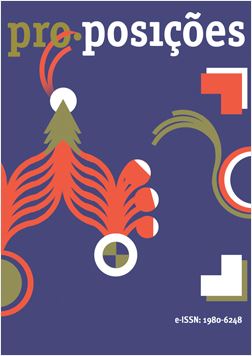Abstract
This article continues Vygotsky’s efforts in investigating the social genesis of affective generalization in artistic creative and reception process proposed in On the problem of the psychology of the actor’s creative work. Affective generalization abstracts emotions and feelings from the individual to the social plane and from the mundane to the hyper-generalized level. Based on an examination of Vygotsky’s aesthetic ideas, we introduced Chinese philosopher Defeng Wang’s work in philosophy of art under the existential approach. Finally, we propose to adopt the cultural psychology of semiotic mediation as a framework to capture this dynamic process.
References
Heggstad, K. M. (2019). 7 paths to drama in education (M. Y. Wang & Z. Wang, trans.). East China Normal University Press
Heidegger, M. (2002). Off the beaten track (J. Young & K. Haynes, trans.). Cambridge University Press.
Larrain, A., & Haye, A. (2020). The dialogical and political nature of emotions: A reading of Vygotsky’s The Psychology of Art. Theory & Psychology, 30(6), 800-812.
Leontiev, A. N. (1971). Introduction. In The psychology of art (Scripta Technica, Inc., Trans). MIT Press.
Pelias, R. (2004). A methodology of the heart. Evoking Academic and Daily Life Rowman Altamira Press.
Valsiner, J. (2006). The Overwhelming World: Functions of Pleromatization in Creating Diversity in Cultural and Natural Constructions [Keynote Lecture]. International Summer School of Semiotic and Struc-tural Studies, Imatra, Finland.
Valsiner, J. (2013). Creating sign hierarchies: Social representation in its dynamic context. Papers on Social Representations, 22(16), 1021-5573.
Valsiner, J. (2014). An invitation to cultural psychology Sage.
Valsiner, J. (2015). The place for synthesis: Vygotsky’s analysis of affective generalization. History of the human sciences, 28(2), 93-102.
Valsiner, J. (2018). Human psyche between the mundane and the aesthetics: The sublime as the arena for semiosis. In M. C. D. P. Lyra, & M. A. Pinheiro (Orgs.), Cultural psychology as basic science dialogues with Jaan Valsiner (pp. 43-56). Cham: Springer.
Valsiner, J. (2020). Sensuality in human living: The cultural psychology of affect Springer.
van der Veer, R., & Zavershneva, E. (2011). To Moscow with Love: Partial Reconstruction of Vygotsky’s Trip to London. Integrative Psychological & Behavioral Science, 45(4), 458-74.
Vigotski, L. S. (2023). Sobre a questão da psicologia da criação pelo ator. (P.N. Marques, Trad.). Pro-Posições, 34, ed0020210085. http://dx.doi.org/10.1590/1980-6248-2021-0085 (Original work published 1936).
Vygotsky, L. S. (1971). Psychology of art New York: MIT Press.
Vygotsky, L. S. (1999). On the problem of the psychology of the actor’s creative work. The collected works of LS Vygotsky, 6, 237-244.
Wang, D. F. (2005) Philosophy of art Fudan University Press.
Wu, X. M. (2001a). On the ontological basis of Marx’s philosophy. Academic Monthly, 9(90), 90-100.
Wu, X. M. (2001b). The existential approach in contemporary philosophy. Philosophy Study, (12), 9-11.

This work is licensed under a Creative Commons Attribution-NonCommercial 4.0 International License.
Copyright (c) 2023 Pro-Posições


